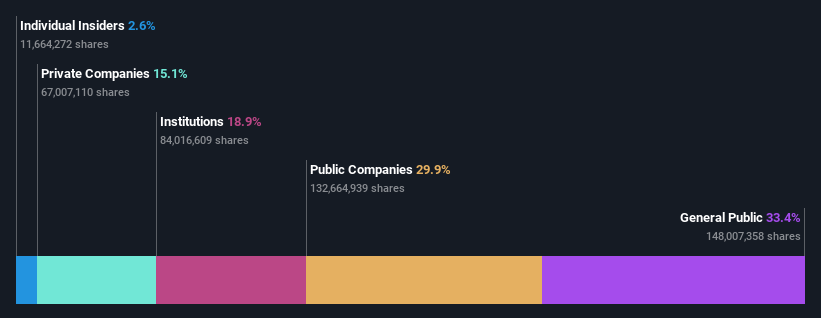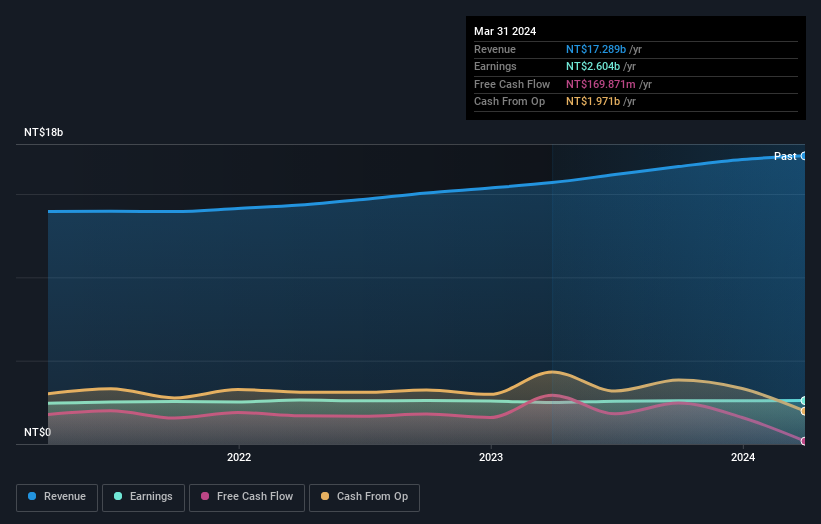- Taiwan
- /
- Commercial Services
- /
- TWSE:9917
Taiwan Secom Co., Ltd.'s (TWSE:9917) largest shareholders are individual investors who were rewarded as market cap surged NT$2.2b last week

Key Insights
- Significant control over Taiwan Secom by individual investors implies that the general public has more power to influence management and governance-related decisions
- 51% of the business is held by the top 8 shareholders
- Institutional ownership in Taiwan Secom is 19%
A look at the shareholders of Taiwan Secom Co., Ltd. (TWSE:9917) can tell us which group is most powerful. The group holding the most number of shares in the company, around 33% to be precise, is individual investors. Put another way, the group faces the maximum upside potential (or downside risk).
As a result, individual investors collectively scored the highest last week as the company hit NT$59b market cap following a 3.9% gain in the stock.
Let's delve deeper into each type of owner of Taiwan Secom, beginning with the chart below.
View our latest analysis for Taiwan Secom

What Does The Institutional Ownership Tell Us About Taiwan Secom?
Institutions typically measure themselves against a benchmark when reporting to their own investors, so they often become more enthusiastic about a stock once it's included in a major index. We would expect most companies to have some institutions on the register, especially if they are growing.
As you can see, institutional investors have a fair amount of stake in Taiwan Secom. This can indicate that the company has a certain degree of credibility in the investment community. However, it is best to be wary of relying on the supposed validation that comes with institutional investors. They too, get it wrong sometimes. When multiple institutions own a stock, there's always a risk that they are in a 'crowded trade'. When such a trade goes wrong, multiple parties may compete to sell stock fast. This risk is higher in a company without a history of growth. You can see Taiwan Secom's historic earnings and revenue below, but keep in mind there's always more to the story.

Hedge funds don't have many shares in Taiwan Secom. Our data shows that SECOM CO., LTD. is the largest shareholder with 29% of shares outstanding. Chengxin Investment Co., Ltd. is the second largest shareholder owning 4.9% of common stock, and Chunghwa Post Co., Ltd. holds about 4.1% of the company stock. Furthermore, CEO Jian-Han Lin is the owner of 0.8% of the company's shares.
We did some more digging and found that 8 of the top shareholders account for roughly 51% of the register, implying that along with larger shareholders, there are a few smaller shareholders, thereby balancing out each others interests somewhat.
While it makes sense to study institutional ownership data for a company, it also makes sense to study analyst sentiments to know which way the wind is blowing. Our information suggests that there isn't any analyst coverage of the stock, so it is probably little known.
Insider Ownership Of Taiwan Secom
While the precise definition of an insider can be subjective, almost everyone considers board members to be insiders. Management ultimately answers to the board. However, it is not uncommon for managers to be executive board members, especially if they are a founder or the CEO.
Most consider insider ownership a positive because it can indicate the board is well aligned with other shareholders. However, on some occasions too much power is concentrated within this group.
Shareholders would probably be interested to learn that insiders own shares in Taiwan Secom Co., Ltd.. It is a pretty big company, so it is generally a positive to see some potentially meaningful alignment. In this case, they own around NT$1.6b worth of shares (at current prices). It is good to see this level of investment by insiders. You can check here to see if those insiders have been buying recently.
General Public Ownership
The general public-- including retail investors -- own 33% stake in the company, and hence can't easily be ignored. While this group can't necessarily call the shots, it can certainly have a real influence on how the company is run.
Private Company Ownership
We can see that Private Companies own 15%, of the shares on issue. It's hard to draw any conclusions from this fact alone, so its worth looking into who owns those private companies. Sometimes insiders or other related parties have an interest in shares in a public company through a separate private company.
Public Company Ownership
We can see that public companies hold 30% of the Taiwan Secom shares on issue. We can't be certain but it is quite possible this is a strategic stake. The businesses may be similar, or work together.
Next Steps:
I find it very interesting to look at who exactly owns a company. But to truly gain insight, we need to consider other information, too. Consider for instance, the ever-present spectre of investment risk. We've identified 1 warning sign with Taiwan Secom , and understanding them should be part of your investment process.
Of course this may not be the best stock to buy. So take a peek at this free free list of interesting companies.
NB: Figures in this article are calculated using data from the last twelve months, which refer to the 12-month period ending on the last date of the month the financial statement is dated. This may not be consistent with full year annual report figures.
Valuation is complex, but we're here to simplify it.
Discover if Taiwan Secom might be undervalued or overvalued with our detailed analysis, featuring fair value estimates, potential risks, dividends, insider trades, and its financial condition.
Access Free AnalysisHave feedback on this article? Concerned about the content? Get in touch with us directly. Alternatively, email editorial-team (at) simplywallst.com.
This article by Simply Wall St is general in nature. We provide commentary based on historical data and analyst forecasts only using an unbiased methodology and our articles are not intended to be financial advice. It does not constitute a recommendation to buy or sell any stock, and does not take account of your objectives, or your financial situation. We aim to bring you long-term focused analysis driven by fundamental data. Note that our analysis may not factor in the latest price-sensitive company announcements or qualitative material. Simply Wall St has no position in any stocks mentioned.
Have feedback on this article? Concerned about the content? Get in touch with us directly. Alternatively, email editorial-team@simplywallst.com
About TWSE:9917
Solid track record with adequate balance sheet and pays a dividend.


